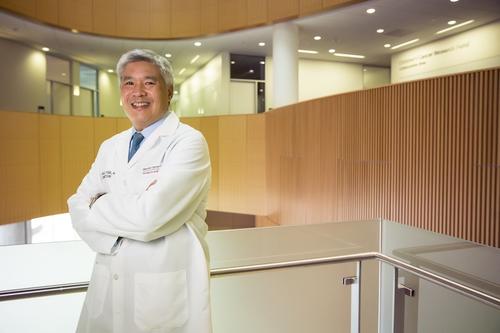
October is National Breast Cancer Awareness Month. The American Cancer Society estimates there will be 4,670 new cases of breast cancer in Minnesota in 2020.
Douglas Yee with the University of Minnesota answers questions on the symptoms, treatment and screening for breast cancer.
Q: What is breast cancer?
Dr. Yee: Breast cancer arises from the normal cells that line the ducts of the breast. These cells undergo genomic changes and “learn” how to grow uncontrollably and spread outside of the breast to lymph nodes and other organs in the body. Breast cancer isn’t something that only affects women. While rare in men, any abnormality in the breast should be brought to the attention of their health care provider.
Q: Which women are more at risk for breast cancer?
Dr. Yee: Some breast cancer risk factors have been identified, including a family history and factors related to a woman’s reproductive history. Some of these factors have been incorporated into a risk calculator. Certain ethnic groups (women of Ashkenazi Jewish heritage) can have an inherited risk of developing breast and other cancers. Other uncommon risk factors include radiation to the chest for treatment of childhood lymphoma or Hodgkins’ disease. Lifestyle factors that can increase breast cancer risk include lack of physical activity, obesity and alcohol intake. However, the risks associated with these behaviors are small compared to other known risk factors for other cancers, such as tobacco smoking and lung cancer.
Q: What are the symptoms of breast cancer and how is it detected?
Dr. Yee: Breast cancer is frequently detected by screening tests including mammography and breast magnetic resonance imaging (MRI). Mammographic screening is recommended for women of average risk, although the age at which to start and the frequency (yearly or every other year) is somewhat controversial. MRI imaging is only reserved for those women of the highest risk. Clinical breast exam by a health care provider is also recommended as a way to screen for breast cancer. While breast self-exam is not recommended as a screening test, any abnormal lump should be brought to a health care provider's attention. Even though the COVID-19 pandemic may discourage people from going to see their doctor, it is still important to keep up with regular breast cancer screenings. The Director of the National Cancer Institute has estimated that a 6 month delay in mammographic screening across the United States could result in an increase in breast cancer deaths. Currently there are two large national clinical trials evaluating appropriate screening strategies (WISDOM and TMIST) and women should be encouraged to participate in these important trials if available.
Q: What are the treatment options for breast cancer?
Dr. Yee: Breast cancer is almost always treated by surgery – lumpectomy or mastectomy. Additional therapies including radiation therapy after lumpectomy may be advised. In my view, the most important part of breast cancer therapy relates to the use of medical (adjuvant) therapy such as hormone therapy or chemotherapy before or after surgery. Since some breast cancers “learn” to spread to other organs very early in their development, adjuvant therapy has been shown to reduce the risk of recurrence and death from breast cancer because it kills any small groups of breast cancer cells that spread to other organs. Over the past 10 years, new genomic tests have helped women with hormone responsive cancers determine if chemotherapy plus hormone therapy or hormone therapy alone is the best adjuvant therapy.
Q: What are you doing to advance breast cancer research?
Dr. Yee: My research is focused on understanding if common hormones – insulin and insulin-like growth factors – contribute to the growth, survival and spread of breast cancers. We are developing strategies to block these common hormones without influencing their normal functions including glucose control and growth. I am also working on a project, led by Dr. Reuben Harris, to understand how breast cancer cells continue to develop mutations and become resistant to effective therapy. At the Masonic Cancer Center, I am involved in many clinical trials with the goal of developing new effective treatments for breast cancer, such as the I-SPY2 TRIAL.
Dr. Douglas Yee, director of Masonic Cancer Center and a professor at the University of Minnesota Medical School, is an expert in breast cancer research and treatment. His research is particularly focused on understanding the contribution of growth factor regulation of breast cancer.
- 30 -
About “Talking...with U of M”
“Talking...with U of M” is a resource whereby University of Minnesota faculty answer questions on current and other topics of general interest. Feel free to republish this content. If you would like to schedule an interview with the faculty member or have topics you’d like the University of Minnesota to explore for future “Talking...with U of M,” please contact University Public Relations at [email protected].
- Categories:
- Health




